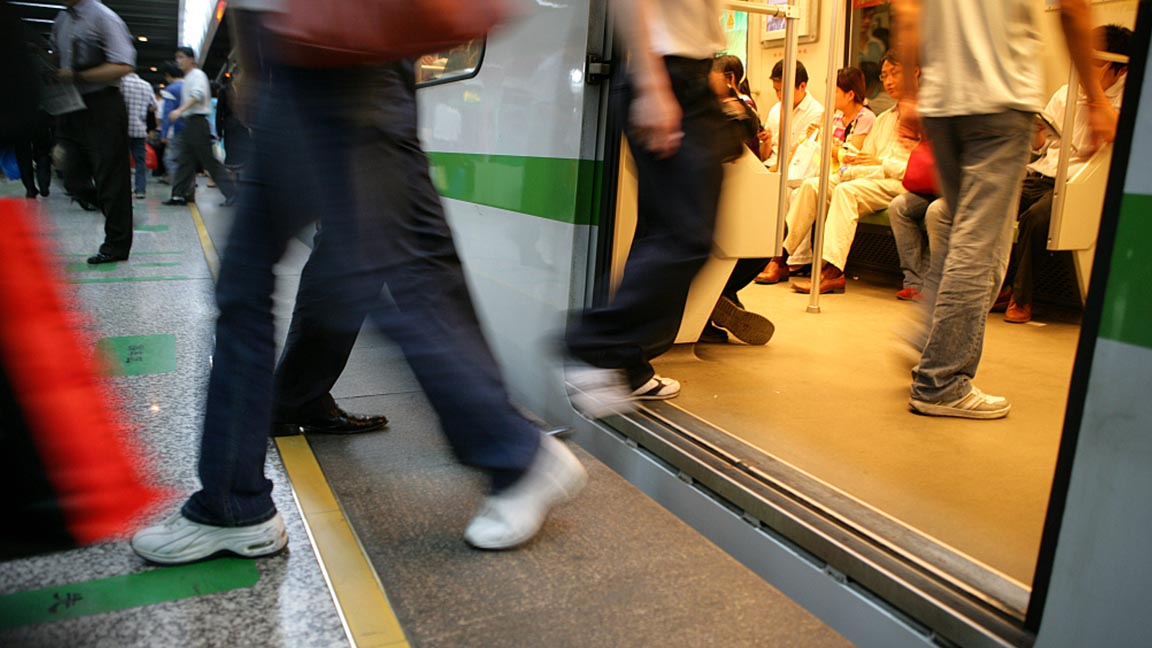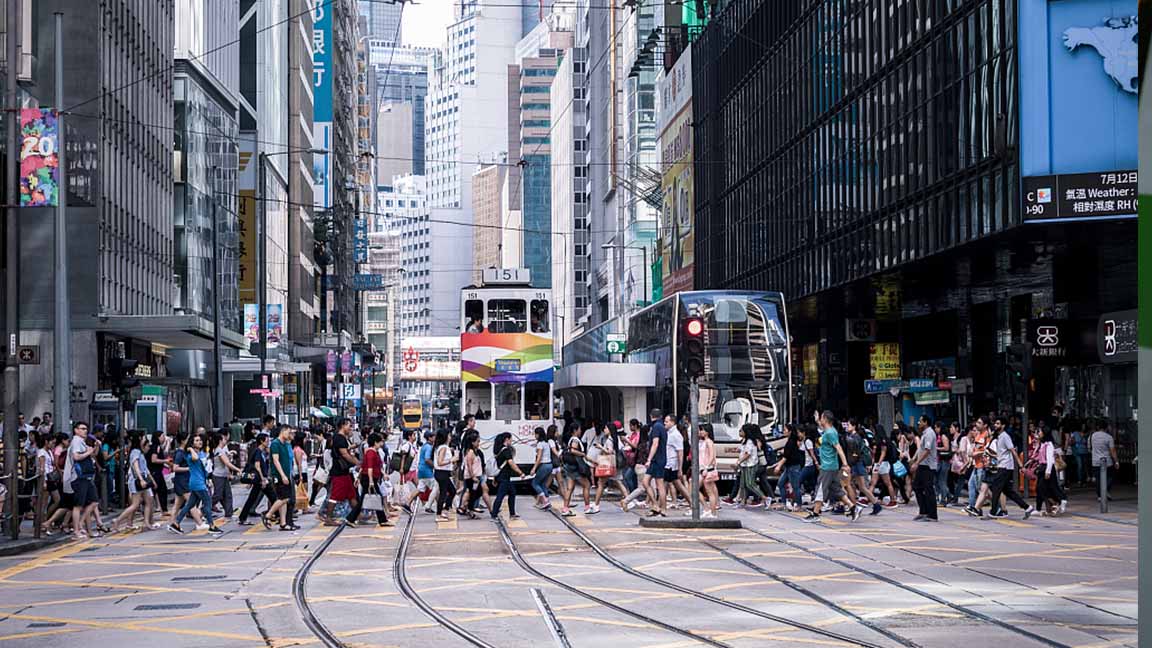07:54

Editor's note: This week, Global Business's "Two Sessions Econ Forum" will help you decipher the policies and proposals from China's lawmakers and political advisers each day during the Two Sessions.
China has put stabilizing employment in the country as a top priority this year, even as the COVID-19 pandemic increased pressure on jobs in the world's second largest economy, but analysts said that the big challenges lie within the implementation of such at the micro level, especially for local governments at the provincial level.
Last Friday, Chinese Premier Li Keqiang said the government plans to stabilize employment through the coordinated use of "fiscal, monetary, and investment policies," and recognized that those in the micro-, small-, and medium-sized businesses were facing growing difficulties.
"We will strive to keep existing jobs secure, work actively to create new ones, and help unemployed people find work. All local governments need to overhaul or rescind excessive restrictions on employment, and adopt all possible measures to bolster employment," Premier Li said when delivering the government's 2020 work report during the 13th National People's Congress.
Citigroup expects as many as 25 million potential unemployed workers this year if the government comes "short of effective policy responses," and its chief China economist Liu Ligang said one of the issues would be an alignment of priorities between central and local governments.
"We all know that at this moment provincial governments are asked to contain the coronavirus outbreak at the same time they need to create as many jobs as possible."
"We need to balance these two to prevent the local government from putting too much emphasis on containing the virus outbreak ... while not doing enough to grow the local economy and create more jobs," Liu said.
The Chinese government has decided to do away with a growth target for 2020. This decision, Liu said, may inadvertently put less pressure on local governments to grow the economy. However, he said that the country still "needs to somewhat aim at a certain pace of growth" which he said Citigroup estimates could be four percent based on the job creation target.
"In our study we tend to find a simple benchmark. That is with every one percentage growth in China, it created around 2.2 million new jobs. This means that for the nine million job target to be fulfilled, the implied growth rate this year, even without explicit growth target, could be as high as four percent," Liu explained.
He said that if the Chinese government can get through a difficult second quarter, and reach a potential 6.2 percent in the second half of the year, then unemployment pressure could be mitigated.
Migrant workers, he added, make up 40 percent of the people forecast to have lost jobs this year. "If they [migrants] cannot find jobs that will return to the rural sector as a result. Perhaps rural poverty could arise," he added.
That is why that while the central government needs to have a large enough fiscal stimulus to absorb a lot of migrant workers in the remainder of the year, local governments also need to recognize these issues and in turn have infrastructure projects start "as soon as possible" to absorb "as many migrant workers as possible."
Liu also said that the governments have already been "way ahead" in terms of its micro-level policies on setting job targets. "In fact, if you look at some of the micro-level policy interventions announced by the State Council, it appeared to be the way ahead. For example, this year, the Chinese government will hire more teachers and hospital workers at the entry level, so that more college graduates can get jobs."
At a private sector level — which makes up 80 percent of the Chinese workforce — tax incentives could be given for firms willing to take in more interns, new college graduates.
04:28

Professor: Local and central government role in job creation
Liu Baocheng, dean of the Center for International Business Ethics, University of International Business and Economics, agreed that central and local governments need to be aware of implementation challenges when it comes to the complex issue of unemployment.
Liu said while local governments may understand the provincial scenarios better, they may not have the same agenda and big picture overview as the central government, which is able to balance the overall pros and cons.
"Well, you can be a good music composer, but if you have a lousy player and a lousy instrument, you still don't produce the right type of music to the audience."
"Therefore, from the central government's side, as a composer, you need to really take into consideration what musical instruments those are playing and what are the level of capacity and skill sets of local governments," Liu said. He praised China's central government for putting a lot of emphasis on capacity building and enhancing the governance level of particularly local governments, which were issues that Premier Li touched on in his government work report.
China targets to set aside nearly 54 billion yuan, or about 7.6 billion U.S. dollars, of employment subsidies this year. The government will utilize over 100 billion yuan of special funds for vocational skills training. The government report also listed multiple measures to guarantee basic living standards for unemployed workers.
According to the National Bureau of Statistics (NBS), China's urban unemployment rate had jumped to a record high of 6.2 percent in February, from 5.3 percent. It stayed around six percent in March and April. The number of migrant workers from the countryside to cities dropped from 174 million in the last quarter of 2019 to 123 million in the first three months of 2020, the 30.6 percent drop is the largest decrease since the index has been published since 2012, according to the data from the NBS.
A firm has found that estimating that the actual number of people who have lost jobs has been challenging, with forecasts ranging from tens of millions to over a hundred million, given that statistics between urban and rural workforce were separate.
"A major deficiency in calculating unemployment is that we still have a very strong institutional divide between urban working force and rural working force," said Liu, adding that the government needs to expand the tracking to be "more representative," and this would enable policymakers to make more calculated decisions based on a closer picture of reality.
06:20

Roland Berger: Challenging to help all SMEs
Denis Depoux, global managing director of Roland Berger in Shanghai, said that it was very difficult for China's government to cope with small- and medium-sized enterprises (SME).
"Because the kind of focus they have is very micro. The best the government can do is to create a favorable environment," he said.
Depoux said that a few moving parts need to come together for things to work, including banks lending to SMEs and entrepreneurs, state-owned enterprises growing networks and supply chains to subsequently grow SMEs.
"It's about regulation. It's about a flexible work format to ease the burden of hiring. Probably some temporary waiver of social charges as we have seen. So it's creating flexibility at a time when people are hesitant, especially small enterprises, to hire people," he added.
Depoux said it was vital too to support sectors in the social infrastructure area that can help create jobs, such as education, health care, elderly care and household services.
He also said that China's digitalization has been playing a big role against the fight in the fight against the virus "by creating proximity, connectivity."
"So I think we're moving from a sharing economy and nobody wants to share a car these days to the digital proximity economy thanks to the crisis."
"By the way, Taobao did great in 2003 at the height of the SARS crisis. Let's remember that digitization can help circumvent social distancing. So it does help protect businesses like capturing complex orders in restaurants, tracking processes. But it's also developing new online models in the auto supply area in the education area in the culture, entertainment area," he noted, adding that he expects more online tourism as well.
(CGTN's Michael Wang also contributed to the story.)